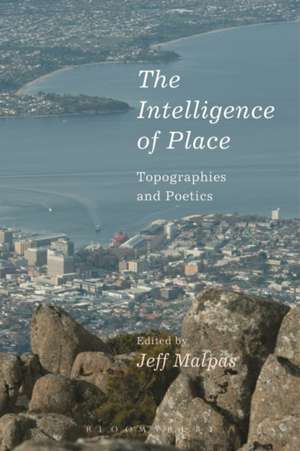The Intelligence of Place: Topographies and Poetics
Editat de Distinguished Professor Jeff Malpasen Limba Engleză Paperback – 17 mai 2017
| Toate formatele și edițiile | Preț | Express |
|---|---|---|
| Paperback (1) | 258.59 lei 43-57 zile | |
| Bloomsbury Publishing – 17 mai 2017 | 258.59 lei 43-57 zile | |
| Hardback (1) | 775.02 lei 43-57 zile | |
| Bloomsbury Publishing – 21 oct 2015 | 775.02 lei 43-57 zile |
Preț: 258.59 lei
Preț vechi: 331.75 lei
-22% Nou
Puncte Express: 388
Preț estimativ în valută:
49.49€ • 51.37$ • 41.26£
49.49€ • 51.37$ • 41.26£
Carte tipărită la comandă
Livrare economică 24 martie-07 aprilie
Preluare comenzi: 021 569.72.76
Specificații
ISBN-13: 9781350036338
ISBN-10: 1350036331
Pagini: 296
Ilustrații: 17 b/w illustrations
Dimensiuni: 156 x 234 x 24 mm
Greutate: 0.42 kg
Ediția:NIPPOD
Editura: Bloomsbury Publishing
Colecția Bloomsbury Academic
Locul publicării:London, United Kingdom
ISBN-10: 1350036331
Pagini: 296
Ilustrații: 17 b/w illustrations
Dimensiuni: 156 x 234 x 24 mm
Greutate: 0.42 kg
Ediția:NIPPOD
Editura: Bloomsbury Publishing
Colecția Bloomsbury Academic
Locul publicării:London, United Kingdom
Caracteristici
Draws together many of the key thinkers currently writing on place including Edward Casey, Kathleen Stewart, Joshua Meyrowitz and Deborah Bird Rose
Notă biografică
Jeff Malpas is Distinguished Professor of Philosophy, University of Tasmania, Australia.
Cuprins
Notes on ContributorsIntroduction1. Place and Edge, Edward Casey (Distinguished Professor of Philosophy at Stony Brook University, USA)2. Place and Limit, Massimo Cacciari (Italian Institute for Philosophical Studies, Naples, Italy and the Collége de Philosophie, Paris, France) 3. Place and Histories - Writing Other People's Memories, Lucy R. Lippard (Free lance Writer)4. Place and Time, Jeff Malpas (Distinguished Professor, University of Tasmania and Visiting Distinguished Professor, Latrobe University, Australia)5. Place and Media, Joshua Meyrowitz (Professor of Communications, University of New Hampshire, USA)6. Place and Atmosphere, Juhani Pallasmaa (Professor Emeritus, Juhani Pallasmaa Architects)7. Place and Architectural Space, Alberto Perez-Gomez (Saidye Rosner Bronfman Professor in History and Theory of Architecture, McGill University School of Architecture, Canada) 8. Place and Connection, Edward Relph (Professor of Geography, University of Toronto, Canada) 9. Place and Sensory Composition, Kathleen Stewart (Professor of Anthropology, University of Texas at Austin, USA)10. Place and Formulation, Kenneth White (Royal Scottish Academy, Professor of Twentieth-Century Poetics, Sorbonne, Paris)Index
Recenzii
This volume is a signal contribution to work in "place studies." Malpas's selection of contributors is prescient because they are some of the most perceptive thinkers writing conceptually about place today, including philosopher Edward Casey, writer Lucy Lippard, media-studies scholar Joshua Meyrowitz, geographer Edward Relph, and architects Juhani Pallasmaa and Alberto Perez-Gomez. The result is an interdisciplinary synergy provoking valuable new ideas and perspectives on place, place experience, and place meaning.
Today many scholars and students of place-based studies-architecture, geography, anthropology, politics and philosophy-feel that a choice between globalism and localism is wrongheaded and unproductive. Offered here is a forward-looking alternative, a set of reflections that restates the centrality of place in human experience, without resorting to nostalgic forms of place-identity or apocalyptic notions of place-disintegration. The idea that places have their own intelligence, that the wisdom that will guide ethical and practical choices in contemporary culture is in the world not only individual selves, is both timely and challenging.
Today many scholars and students of place-based studies-architecture, geography, anthropology, politics and philosophy-feel that a choice between globalism and localism is wrongheaded and unproductive. Offered here is a forward-looking alternative, a set of reflections that restates the centrality of place in human experience, without resorting to nostalgic forms of place-identity or apocalyptic notions of place-disintegration. The idea that places have their own intelligence, that the wisdom that will guide ethical and practical choices in contemporary culture is in the world not only individual selves, is both timely and challenging.
